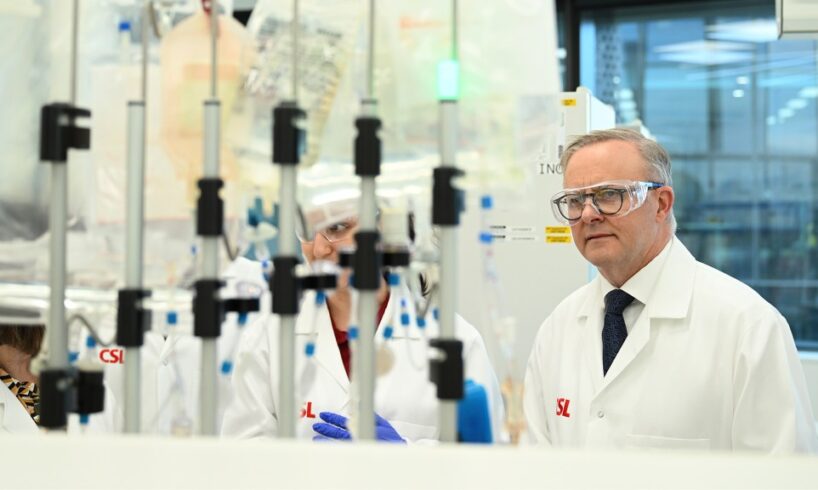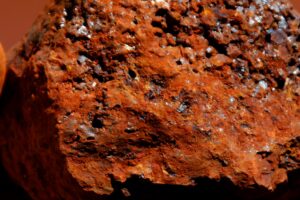
At a time when the nation’s chattering classes and business community are focusing on improving productivity and innovation, what’s one of the country’s few global brands in innovative high-tech manufacturing doing? Engaging in the sort of games that mark out lazy, mediocre Australian companies.
CSL is a major Australian success story: a one-time Commonwealth vaccine, blood products and anti-venom agency privatised by the Keating government in a float valued at $294 million. As of Monday, it was valued at more than $131 billion. But by Tuesday’s close, its shares had lost 17% and more than $20 billion — the result of the company announcing it was walking away from vaccines by spinning off its vaccine arm, CSL Seqirus, and sacking 3,000 employees.
Why? There was nothing in the company’s 2024-25 annual results to suggest the need for such a dramatic cut. Earnings and revenue were firm, the dividend was up, and the outlook was normal for a company that has maintained a reputation for being stable and well-run.
The only problem for CSL is in the United States. The company stated in its results that CSL Seqirus “was negatively impacted by significantly low influenza immunisation rates, particularly in the US”.
Independent. Irreverent. In your inbox
Get the headlines they don’t want you to read. Sign up to Crikey’s free newsletters for fearless reporting, sharp analysis, and a touch of chaos
By continuing, you agree to our Terms & Conditions and Privacy Policy.
Related Article Block Placeholder
Article ID: 1218034
That’s despite the US flu season (flu vaccines are a CSL Seqirus speciality) in 2024-25 being particularly severe — indeed, one of the “worst on record“, likely exacerbated by low vaccine rates. The decline in US vaccination rates, especially among children, has seen many once-rare diseases come roaring back in US communities, killing people in their wake. US Health Secretary Robert F. Kennedy Jnr’s vaccine scepticism (to put it generously) has reinforced more blatant hostility to vaccines from other government officials.
CSL’s share price hit a peak of $311 a year ago this month, just as Donald Trump was emerging as the likely winner of the presidential election. Trump’s plans for huge tariff barriers around the US were seen as a negative for CSL — and the Mad King has a history of vaccine scepticism and draws support from heavily anti-vaccine groups.
For a company considered an outlier in Australia for its concentration on research and development and building positions in key products, the justification for the massive cuts offered yesterday by CEO Dr Paul McKenzie was long on the sort of business-speak we’re used to from the cavalcade of second-rate CEOs and boards that lead large Australian oligopolist companies.
Behold the clichés:
The transformational initiatives we are announcing today will further reshape and simplify the business, provide a platform to renew CSL’s focus on our core strengths, and ultimately create even more value for our stakeholders through sustainable, profitable growth … multiple growth opportunities driven by increasing patient demand, unique competitive positions, and scalable platforms … core strengths … lean and efficient mindset … optimising our capital structure … transformational initiatives … clinical and commercial execution … simplifying decision making.
It must have taken ChatGPT at least two seconds to produce that pabulum.
And like mediocre oligopolists, CSL loves a share buyback: it plans to restart what will be “a multi-year, on-market share buyback, starting with A$750m in Financial Year 2026, and is expected to progressively increase over the medium-term. The program will enhance capital efficiency and improve shareholder returns.”
Related Article Block Placeholder
Article ID: 1218163
How much it will flow to innovation, research and new products remains to be seen. You can make an Australian company a global brand, but it seems you can’t eradicate the Australian obsession with feeding shareholders ever bigger returns instead of investing in the next key product or new technology.
But CSL ended up with the worst of both worlds: not even sharemarkets were impressed. In the wake of Tuesday’s announcement, Craig Sidney, a senior investment advisor at Shaw and Partners, told Reuters that the vaccines spin-off could unlock some value and “may well be positive”, and that though “cutting back staff is normally a positive thing”, he suspects “it will have an impact on earnings growth, and that’s what the market seems to be focused on at the moment”.
There’s not much anyone can do about the vast tide of stupidity washing over the United States, bringing dead children and early mortality in its wake. But no-one’s forcing CSL to act like every big dumb oligopolist in the ASX — not even its shareholders.





